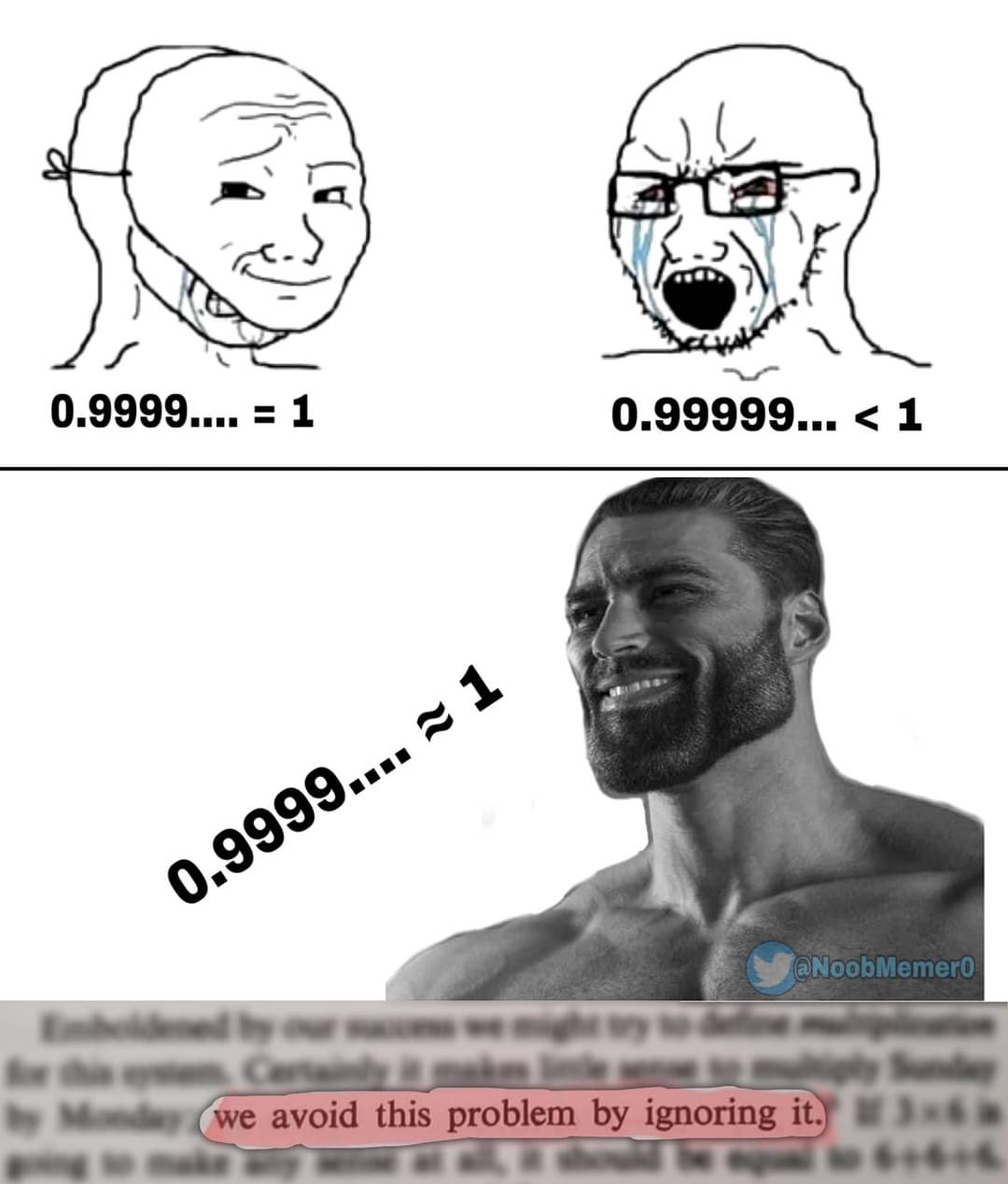this post was submitted on 27 Jun 2024
817 points (95.2% liked)
Science Memes
10970 readers
2145 users here now
Welcome to c/science_memes @ Mander.xyz!
A place for majestic STEMLORD peacocking, as well as memes about the realities of working in a lab.

Rules
- Don't throw mud. Behave like an intellectual and remember the human.
- Keep it rooted (on topic).
- No spam.
- Infographics welcome, get schooled.
This is a science community. We use the Dawkins definition of meme.
Research Committee
Other Mander Communities
Science and Research
Biology and Life Sciences
- [email protected]
- [email protected]
- [email protected]
- [email protected]
- [email protected]
- [email protected]
- [email protected]
- [email protected]
- [email protected]
- [email protected]
- [email protected]
- [email protected]
- [email protected]
- [email protected]
- [email protected]
- [email protected]
- [email protected]
- [email protected]
- [email protected]
- [email protected]
- [email protected]
- [email protected]
- [email protected]
- [email protected]
- !reptiles and [email protected]
Physical Sciences
- [email protected]
- [email protected]
- [email protected]
- [email protected]
- [email protected]
- [email protected]
- [email protected]
- [email protected]
- [email protected]
Humanities and Social Sciences
Practical and Applied Sciences
- !exercise-and [email protected]
- [email protected]
- !self [email protected]
- [email protected]
- [email protected]
- [email protected]
Memes
Miscellaneous
founded 2 years ago
MODERATORS
you are viewing a single comment's thread
view the rest of the comments
view the rest of the comments

The rules of decimal notation don't sipport infinite decimals properly. In order for a 9 to roll over into a 10, the next smallest decimal needs to roll over first, therefore an infinite string of anything will never resolve the needed discrete increment.
Thus, all arguments that 0.999... = 1 must use algebra, limits, or some other logic beyond decimal notation. I consider this a bug with decimals, and 0.999... = 1 to be a workaround.
Please explain this in a way that makes sense to me (I'm an algebraist). I don't know what it would mean for infinite decimals to be supported "properly" or "improperly". Furthermore, I'm not aware of any arguments worth taking seriously that don't use logic, so I'm wondering why that's a criticism of the notation.
Decimal notation is a number system where fractions are accomodated with more numbers represeting smaller more precise parts. It is an extension of the place value system where very large tallies can be expressed in a much simpler form.
One of the core rules of this system is how to handle values larger than the highest digit, and lower than the smallest. If any place goes above 9, set that place to 0 and increment the next place by 1. If any places goes below 0, increment the place by (10) and decrement the next place by one (this operation uses a non-existent digit, which is also a common sticking point).
This is the decimal system as it is taught originally. One of the consequences of it's rules is that each digit-wise operation must be performed in order, with a beginning and an end. Thus even getting a repeating decimal is going beyond the system. This is usually taught as special handling, and sometimes as baby's first limit (each step down results in the same digit, thus it's that digit all the way down).
The issue happens when digit-wise calculation is applied to infinite decimals. For most operations, it's fine, but incrementing up can only begin if a digit goes beyong 9, which never happens in the case of 0.999... . Understanding how to resolve this requires ditching the digit-wise method and relearing decimals and a series of terms, and then learning about infinite series. It's a much more robust and applicable method, but a very different method to what decimals are taught as.
Thus I say that the original bitwise method of decimals has a bug in the case of incrementing infinite sequences. There's really only one number where this is an issue, but telling people they're wrong for using the tools as they've been taught isn't helpful. Much better to say that the tool they're using is limited in this way, then showing the more advanced method.
That's how we teach Newtonian Gravity and then expand to Relativity. You aren't wrong for applying newtonian gravity to mercury, but the tool you're using is limited. All models are wrong, but some are useful.
Said a simpler way:
1/3= 0.333...
1/3 + 1/3 = 0.666... = 0.333... + 0.333...
1/3 + 1/3 + 1/3 = 1 = 0.333... + 0.333... + 0.333...
The quirk you mention about infinite decimals not incrementing properly can be seen by adding whole number fractions together.